He Started As A "Percolating Puppy"
Deek Watson started out as a member of a coffee pot band called the "Percolating Puppies" that played on the street corners of Indianapolis about 1928. After some time on his own (according to his book, he worked at Madame Walker's Ballroom where he danced, sang, acted as floor manager and gave dancing lessons on a part-time basis while he was still in school), he became a member of the "Four Riff Brothers" about late 1932. This group performed around Indianapolis and later did more than 60 radio shows over WLW(Cincinnati) from early February to early September 1933. Again according to his book, Deek went out on his own in Cleveland playing solo at the Glove Theater and Mama Louise's Supper Club. In Cleveland, he met Jerry and Charlie and they formed a trio in the fall of 1933 which at first may have been called the Gates Brothers but soon became better known as the "King, Jack and Jester." This group moved to Cincinnati about the end of 1933 and began regular broadcasts over WLW and WSAI. Between 27Dec/33 and 1Jul/34, they performed in about 200 fifteen minute shows.
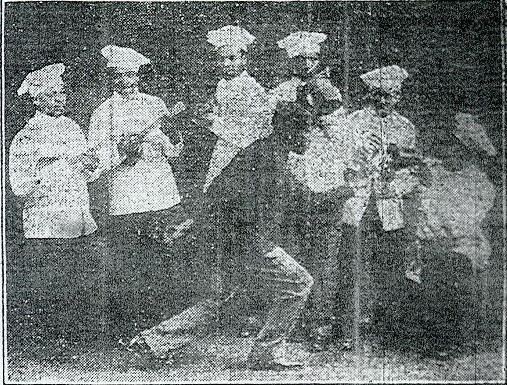
The Percolating Puppies performed beginning about early 1928
Deek's Time With the original Ink Spots
At the beginning, Deek Watson may have been the main
force behind the Ink Spots as he suggests in his book. Certainly, he was
one of the major components of what became known as the Ink Spots style.
This style included Bill Kenny's high tenor, Hoppy Jones talking chorus
and Deek's jivey parts and his mannerisms. For good or bad, he was certainly
the most noticeable Ink Spot because of these mannerisms including rolling
his eyes, waving his hands (something Bill Kenny was accused of also)
and the comments he made during performances such as; "home cookin"
and "it's in the bag."
While Deek always believed that these mannerisms constituted showmanship,
there were many critics over the years who believed his actions were,
"...degrading to his race." [Downbeat, 15July/44] His performance
with the Ink Spots at the Orpheum Theater in Los Angeles during the last
week of April/44 was reviewed very unfavorably by three black newspapers.
Reviewers criticized him for using an "uncle Tom" routine and
one reviewer for the Los Angeles Tribune characterized the group as "four
singing chimpanzees." Moe Gale, the Ink Spots manager threatened
libel suits against the three black newspapers following release of the
reviews. It is not clear that Deek ever accepted these criticisms and
these mannerisms got him into trouble with subsequent groups as well.
As time passed, the Bill Kenny/Hoppy ballads took over most of the Ink
Spots repertoire. Deek's role was gradually reduced and fewer and fewer
numbers that featured Deek were recorded. In spite of this, it seems that
Deek's kind of song continued to be popular with theater and radio audiences.
Songs like Java Jive and You're Feet's Too Big were performed regularly,
although there were fewer of them, up to the time he left the group.
Like Bill Kenny, Deek is known to have liked his gambling. Whether the
extent of his gambling and the amounts at stake are accurate in his book,
where he mentions amounts of $100,000 and $200,000, can't be known but
other sources support frequent gambling and high stakes.
Deek Watson left the Ink Spots after appearing at the State Theater in Hartford in early September/44 (even though, in his book, Deek states that they stayed together until "about 1951). Marv Goldberg's interview with Bernie Mackey indicates he left because Bill Kenny got a raise from manager Moe Gale while he and Hoppy did not. Other stories suggest Bill Kenny simply refused to let him come back to the group after he was off due to illness. It is clear that Bill Kenny declined Deek's subsequent attempts to return to the group later in 1944.
After the Original Ink Spots:
Deek Watsons activities after he left the Original Ink
Spots group in early September of 1944 are not easy to sort out. There
are some gaps, contradictions and differing opinions but the following
attempts to sort out what is known from what is not known. In addition,
some possibilites and mysteries are discussed.
The Brown Dots
After he left the original Ink Spots in early September of 1944, Deek Watson formed his own group. There is some uncertainty as to whether Deek first formed a group called the Ink Spots that included Deek, high tenor Joe King, bass, Jimmy Gordon and another member. Marv Goldberg has a note from a 1972 interview with Jimmy Nabbie who said Deek had an Ink Spots group before he formed the Brown Dots. Whether or not this group existed, Deek formed a group called the Brown Dots early in 1945 with Pat Best and Jimmy Gordon according to Pat Best. Pat says that Joe King joined the group shortly thereafter. When he announced the formation of the Brown Dots, Deek said that his group was based on a completely new concept. In reality, only the name was new - the style copied the original Ink Spots according to reviews.
This group began to make theater appearances and to record on the Manor label. Pat Best told Marv Goldberg that the Brown Dots first appearance at the Plantation Club in St. Louis, while memorable, was not successful. "We were terrible. They threw things at us and booed us off the stage. We'd only rehearsed for a couple of weeks and I only knew two chords on the guitar." Another early appearance was at the Apollo in Harlem where they received a very mixed review [Variety, 7Mar/45]. In about June of 1945, Jimmie Nabbie replaced Joe King and the group started to make progress. By mid-1946, they had two radio shows on the ABC network and, later, they appeared in two movies, Boy, What A Girl and Sepia Cinderella.
As had happened before, Deek began having personality clashes with the other members of this group. According to Marv Goldberg, the other members recruited a new fourth member named Danny Owens and formed a new group called the Sentamentalists. The Sentamentalists also began to record for Manor records.
When Deek found out about this, he formed a new Brown Dots group whose only other known member was Billy Wells (tenor). They recorded on the Majestic, Manor, and Varsity labels during 1949 . A New York Amsterdam News advertisement for a one-week appearance beginning 25Feb/49 indicates that this group continued to perform at least until about the end of the 1940s.
The Mystery of the 4 Dots:
One interesting recording was made on the Castle label by "The Four Dots featuring Deek Watson". Some sources put the date of this 78 rpm recording about 1948 when Deek had his 3rd Brown Dots group but it does not appear to feature the members of this group. Lorenzo Conyers seems to be on this record and, possibly, Sammy Pierce - both of whom did not join Deek in an Ink Spots group until 1955!
After the final Brown Dots group ended about early 1949, (or even while the last Brown Dots group existed), did Deek experiment with a different "4 Dots" group that included Conyers and, possibly Pierce? The Castle 45 recording was issued in 1952 so this recording was made before this date.
We would be pleased to hear from anyone who can help to explain more
about this recording.
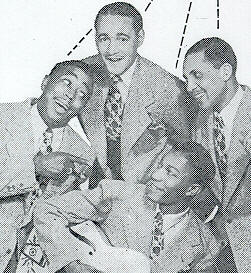
The 1st Brown dots, clockwise from left, Deek Watson, Joe King, Jimmy
Gordon and Pat Best with guitar.
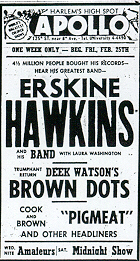
Advertisement for a Brown Dots appearance
[New York Amsterdam News, 26Feb/49]
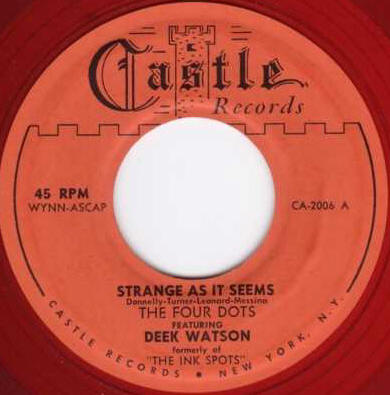
Strange As It Seems - the mystery Castle record
[this 45 is from Greg Centamore's collection]
Other Activities
While with the Brown Dots, Deek make headlines for two other incidents. In 1948, he was arrested for assault after wrecking an apartment in Harlem [Afro-American, 4Dec/48} and in 1949 he was arrested for possessing two marijuana cigarettes. [Afro-American, 19Feb/49]
An interesting article in the Indianapolis Recorder of 3May/52 reports that Deek Watson was introducing a unique comedy show, "...staged for everything from theatres in churches, presents the singing comic as a disk jockey, operating a turntable from alongside the marionette stage. There he carries the live end of the show in conversation with the life-like replicas of the stars between numbers of their famous recordings." Marionettes included Bill Robinson, Lena Horne, Billy Eckstine, Pearl Bailey, Louis Armstrong, King Fish, Amos 'N' Andy, Billy Daniels, the Ink Spots, Ella Fitzgerald, Fats Waller, Sarah Vaughn, Duke Ellington and Rochester. This activity apparently didn't last long and Deek soon joined Charlie's Ink Spots group.
Activities such as this one certainly attest to the fact that Deek Watson was one of the real "idea" members of the original group.
Over the years, Deek claimed to have written a number of songs including Your Feet's Too Big, Pork Chops 'N' Gravy and For sentimental Reasons (with Pat Best). Although he apparently did write Pork Chops 'N' Gravy (he is credited on the Decca record label and Watson, Ivory H. is listed by ASCAP as the only composer), it is known that Fisher and Benson wrote Your Feet's Too Big. Pat Best says that Deek had nothing to do with writing For Sentimental Reasons which he wrote long before he joined Deek's Brown Dots but it is listed on BMI as composed by Best and "Deek" Watson. It is known that errors frequently were made in listing songwriters on record labels and this happened with a number of Ink Spots recordings. It is difficult to be certain what songs he might have written but other songs may have included Shout, Brother, Shout (with Fairbanks per label but BMI lists Larry Goss alone), Don't Let Old Age Creep Upon You (all the Ink Spots - Fuqua, Kenny, Watson and Jones are listed for this one on the label), The Devil Was Beatin His Wife (with MacCarthy-BMI), I've Got You Covered (with Crewn-BMI) and What Can I Do (with Marcello-record label). Overall, it certainly seems that another of Deek's talents was songwriting although he overstated his accomplishments in this area.
Deek's Return to Ink Spot Groups
After Charlie Fuqua left Bill Kenny in August of 1952, he formed his own Ink Spots group and recruited Deek Watson, Jimmy Holmes and Harold Jackson. Deek only lasted as a member of this group until early 1953 and the only known recording by this group is one song done as part of the Apollo concerts. Deek then went out on his own for a while and one recording by Deek Watson the Brown Dot, from early 1954, survives.
After the courts supported Deek's right to use the Ink Spots name, he organized a new Ink Spots group that recorded for the Grand Award label in 1955. It has been claimed that some of the best "Ink Spots" work was done by this group. It featured Lorenzo Conyers, Bernie Mackey and Sammy Pierce on the first album but Johnny Reed replaced Sammy Pierce for some of the songs on the second album.
For the 3rd and last Grand Award album, Deek had an entirely different group with Ollie Crawford, Gene Miller and Henry Baxter. Many of the songs on the Grand Award records have been reissued on Colortone, Waldorf, Audition labels and possibly other labels although new songs by the same groups appear on some of these other labels..
Once again,, Deek was dropped by this group. As happened when he was a member of the original Ink Spots, Deek got in trouble rolling his eyes and acting in what many thought was a manner demeaning blacks.
He went on to form other groups, one of which recorded for the Coronet label and other poor quality, budget label records were made.
Later (about the mid-1960s), Deek had another group that saw the return of original Ink Spot Charlie Fuqua along with Lloyd Washington and George Holmes that did go on tour - including appearances in Australia - although we don't know if they recorded. Deek's last known Ink Spots group included Lloyd Washington, Dodge Bolt and Gene Mumford about 1967.
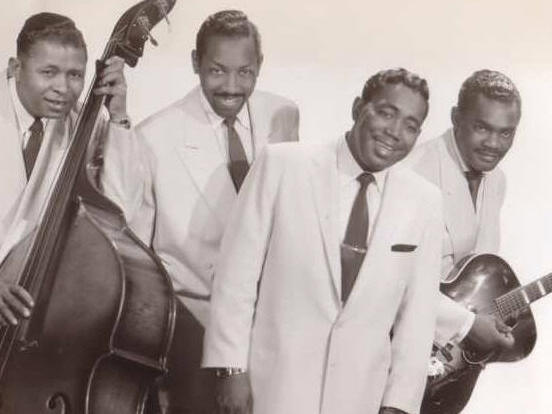
George Steinback (bass), Gene Miller (tenor), Deek Watson (second
tenor), and Benny White (baritone).
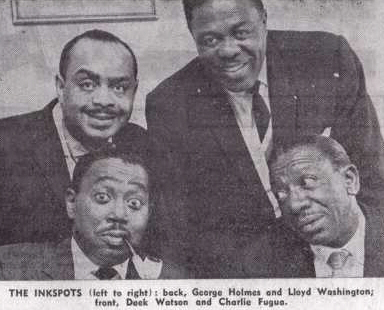
The last Ink Spots group to feature two of the original Ink Spots,
Deek and Charlie.
The Story of the Ink Spots by Deek Watson with Lee Stephenson, Vantage Press, 1967:
Two years before his death from a stroke in 1969, Deek
Watson, with the help of his wife who used the name Lee Stephenson, authored
a book about the Ink Spots and their origins. While this "story"
is an interesting read, it has numerous large and small inaccuracies.
According to Deek:
- he started the Ink Spots and chose their name [possible but no proof exists],
-he organized the group called the Percolating Puppies and directed their move from the street corners to their participation in a whole stage show that Deek claims to have arranged to tour in Ohio and Indiana as "The Harlem Hot Shots, with Deek Watson and his Pecolating Puppies" and to broadcast nightly over WFBM radio in Indianapolis [possible but no proof of radio shows or named stage appearances has been found, we have found a picture of this group in the Indianapolis Recorder from May/28 with a caption that says this coffee pot band was touring the state and appearing in various theaters and this picture agrees with the description of this group in Deek's book],
-he later got a job at Madame Walker's Ballroom where he sang, danced, acted as floor manager and gave dancing lessons in the evening and on weekends while attending school in the day [nothing is known about this],
-after leaving school, he formed the "Four Riff Brothers" quartet [unlikely as the group seems to have formed from the Three Peanut Boys after Leonard Reed left that group and Deek and Slim Green were added to become the Four Riff Brothers],
-the Four Riff Brothers performed on a weekly 1/2 hour radio show, the Good Times Society, on Saturday nights where the Southernaires sang spirituals and they sang popular songs [There was a radio show called the "Rhythm Club" that featured the Charioteers singing spirituals and the Four Riff Brothers. Deek likely is confusing the 1936-37 Good Times Society, where the Ink Spots were regulars, with this show. In addition he is confusing the name of the other quartet],
-he tried to get the other members of the Four Riff Brothers to go to New York but they were homesick so he left for Cleveland where he performed as a single at the Globe Theater and Mama Louise's Supper Club [nothing is known about this],
-later he met Jerry Daniels and Charlie Fuqua and they formed a trio called the King, Jack and Jester. The trio performed at the Club Madrid and signed a one-year contract to broadcast over WHK in Cleveland three times a week ["Jerry and Charlie" did apparently meet Deek in Cleveland and this trio was formed but no broadcasts over WHK or performances in the Cleveland area by this group have been found to date A Marv Goldberg interview of Jerry Daniels agrees with the broadcasts over WHK but this may have happened when the trio used a different name - possibly the Gates Brothers who did broadcast during the fall of 1933],
-"in the dead of winter" he arranged for the group to audition at WLW in Cincinnati where they signed a 2 year contract. After returning to Cleveland to finish their contract, they began to appear on WLW. Deek thought that they would have more success if they were a quartet and he arranged to get Hoppy Jones to come from Indianapolis to join them. The name was changed to the King, Jack and Jesters. [There is no evidence of a 2-year contract but the group performed frequently over WLW and its sister station WSAI for about 6 months from Dec27/33 to July 1/34 - apparently always as a trio. There is no proof that Hoppy joined this group but he may have done so.]
-when the Ink Spots went to England to tour with Jack Hylton in 1934 Deek says the Ink Spots entertained a number of people including the Prince of Wales on the ship going to England and that they played at the Coronation of the Prince of Wales when he became King. [When Marv Goldberg interviewed Jerry Daniels about this, he said that the Ink Spots never had anything to do with the Prince of Wales. Edward VIII abdicated soon after becoming King and there never was a coronation for him!]
-when NBC was experimenting with television in the '30s, the Ink Spots appeared on several programs that were broadcast only within the studio. [The Ink Spots appeared on an experimental broadcast from the Empire State Building to the RCA Building on 6Nov/36]
There are numerous other errors of minor and major importance in the book but the above items give some insight into the variability of it's accuracy. Memory fades with time and, to be fair, some of his recollections do fit with facts that have come to light. It would be interesting to know if other things mentioned in his book did in fact occur including:
-Did the Ink Spots perform in Germany, France and Switzerland with Jack Hylton?
-Did the Percolating Puppies broadcast regularly over WFBM or any Indianapolis radio station?
-Did Hoppy join the King, Jack and Jester Trio and was it renamed the King, Jack and Jesters?
DEEK WATSON GROUPS/SOLO AND RECORDINGS (after leaving the original Ink Spots):
The Ink Spots?
Late 1944?
early 1945
Manor 1005, Let's Give Love Another Chance/Thirty-One Miles For A Nickel, May/45
Manor 1009, You're Heaven Sent/For Sentimental Reasons, May?/45
Manor 1163, Let's Give Love Another Chance, reissue, Feb/49
The 2nd Brown Dots group - Watson, Jimmie Nabbie (high tenor),
Gordon, Best
about June/45 - mid 1947
Manor 1015, Just In Case You Change Your Mind/You're
A Heartache To Me, Nov/45 (1st Jimmie Nabbie)
Manor 1016, That's What She Gets/Escuchame, Jan/46
Manor 1017, Patience And Fortitude/Is It Right, Feb/46
Manor 1026, Satchelmouth Baby/Surrender, ?/46
Manor 1027, If I Can't Have You/I'm Loving You For You, ?/46
Manor 1032, Well Natch/Please Give A Broken Heart A Break, Aug/46
Manor 1040, Rumors Are Flying/You Took All My Love, Sep/46
Manor 1041, For Sentimental Reasons/It's A Pity To Say Goodnight, Sep/46
Manor 1044, How Can You Say I Don't Care/Long Legged Lizzie, Dec/46
Manor 1057, I Don't Know From Nothing Baby/Shout, Brother, Shout, Feb/47
Manor 1075, That's What She Gets/(Why You No Knock-Benny Davis), July/47
Manor 1163, Just In Case You Change Your Mind, reissue, Feb/49
The 3rd Brown Dots group - Watson, Billy Wells (tenor), unknown members
about -1948-49
Majestic 1244, I've Got The Situation Well In Hand/Pray For The Lights
To Go Out, Mar/48
Manor 1166, As Tho You Don't Know/Darktown Strutters Ball, Feb/49
Manor 1170, Bow-wow-wow/At Our Fireplace, Mar/49
Manor 1171, After Awhile/If I Could Be With You (backing Gwen Bell on
both sides), Apr/49
Manor 1179, My Bonnie Lies Over The Ocean/You Better Think Twice, May/49
Varsity 5015, I've Got The Situation Well In Hand/The Devil Was Beatin'
His Wife, ?/49
Brown Dot 298, I've Loved You So Long Baby/The Devil Was Beatin'
His Wife, ca1950, label only indicates Deek Watson
The 4 Dots Featuring Deek Watson - Watson, Conyers, Pierce?, unknown
member
1948?
Castle 2006, Strange As It Seems/Saturday Night Function
Ink Spots - Watson, Charlie Fuqua (baritone/guitar),
Jimmy Holmes (tenor), Harold Jackson (bass)
Sep/52-Early 1953
Apollo Concerts, Session 124, LP, Wish You Were Here
(King recordings are all after Watson left this group and he was replaced
by Essex Scott)
Ink Spots - Watson, Bernie Mackey (baritone/guitar),
Leonard Puzey (tenor), Sammy Pierce (bass)
1953-54
No known recordings by this group
1954
Ink Spots - Watson, Mackey, Lorenzo Conyers (high tenor), Pierce
1955
LP Albums (from here on, groups did not issue 78 rpm
records):
Grand Award 328, Volume 1
Grand Award 354, Volume 2, partly this group and partly next group
about 1956-57
Ink Spots - Watson, Ollie Crawford, Gene Miller, Henry Baxter
1958
Ink Spots - Watson, Miller, Benny White, George
Steinbeck, Jack Oglesby (piano)
about late 1958
Ink Spots, Colortone, 4901
Ink Spots - Watson, Fuqua, Lloyd Washington,
George Holmes
about 1963
No known recordings
Ink Spots - Watson, Washington, Gene Mumford,
Dodge Bolt
1967
No known recordings